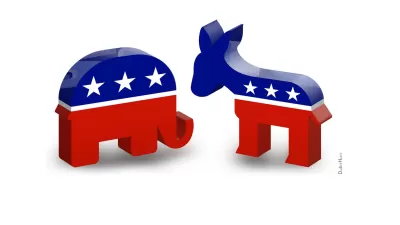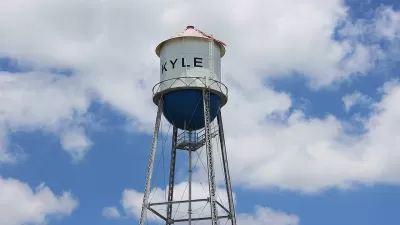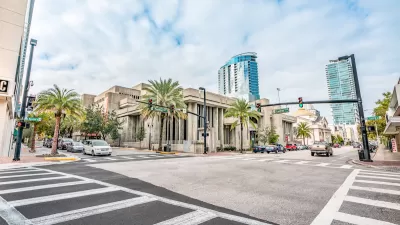In the aftermath of the presidential election, an observation by the star statistician Nate Silver about the connection between sidewalks and voting patterns has been getting a lot of play. Robert Steuteville tries to depoliticize walkability.

Silver's simplified assessment that "if a place has sidewalks, it votes Democratic. Otherwise, it votes Republican," certainly seems to have some truth to it, especially in light of the anti-urban stance of the Republican party. Adds Steuteville: "Sidewalks can even be seen as a kind of metaphor for two kinds of living. Without sidewalks: Independent, anti-government, don't tread on my land. With sidewalks: Communitarian, we're all in this together, equal rights on this right-of-way."
However, as Steuteville points out, "[m]any people who prefer the city and town life are not liberals. Many small towns, with sidewalks and old-fashioned main streets, are politically conservative."
"Our nation needs places with sidewalks and without. We need farmers, we need ranchers, we need the people to work the land. But we also need cities and towns that generate most of our economic activity and, without which, the farmers would have no markets."
It's in the nation's interest to depoliticize walkability, argues Steuteville. "People of all political stripes can benefit from genuine communities with transportation options. Our nation can be strengthened by the sustainability and fiscal resilience of walkable communities."
"Maybe it's time we built a sidewalk that helps bridge the great divide between Red and Blue," he concludes.
FULL STORY: A sidewalk to bridge Red and Blue

Alabama: Trump Terminates Settlements for Black Communities Harmed By Raw Sewage
Trump deemed the landmark civil rights agreement “illegal DEI and environmental justice policy.”

Study: Maui’s Plan to Convert Vacation Rentals to Long-Term Housing Could Cause Nearly $1 Billion Economic Loss
The plan would reduce visitor accommodation by 25% resulting in 1,900 jobs lost.

Why Should We Subsidize Public Transportation?
Many public transit agencies face financial stress due to rising costs, declining fare revenue, and declining subsidies. Transit advocates must provide a strong business case for increasing public transit funding.

Paris Bike Boom Leads to Steep Drop in Air Pollution
The French city’s air quality has improved dramatically in the past 20 years, coinciding with a growth in cycling.

Why Housing Costs More to Build in California Than in Texas
Hard costs like labor and materials combined with ‘soft’ costs such as permitting make building in the San Francisco Bay Area almost three times as costly as in Texas cities.

San Diego County Sees a Rise in Urban Coyotes
San Diego County experiences a rise in urban coyotes, as sightings become prevalent throughout its urban neighbourhoods and surrounding areas.
Urban Design for Planners 1: Software Tools
This six-course series explores essential urban design concepts using open source software and equips planners with the tools they need to participate fully in the urban design process.
Planning for Universal Design
Learn the tools for implementing Universal Design in planning regulations.
Smith Gee Studio
Alamo Area Metropolitan Planning Organization
City of Santa Clarita
Institute for Housing and Urban Development Studies (IHS)
City of Grandview
Harvard GSD Executive Education
Toledo-Lucas County Plan Commissions
Salt Lake City
NYU Wagner Graduate School of Public Service





























